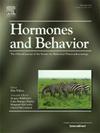Oral administration of ethinyl estradiol and the brain-selective estrogen prodrug DHED in a female common marmoset model of menopause: Effects on cognition, thermoregulation, and sleep
IF 2.4
3区 医学
Q2 BEHAVIORAL SCIENCES
引用次数: 0
Abstract
Menopausal symptoms of sleep disturbances, cognitive deficits, and hot flashes are understudied, in part due to the lack of animal models in which they co-occur. Common marmosets (Callithrix jacchus) are valuable nonhuman primates for studying these symptoms, and we examined changes in cognition (reversal learning), sleep (48 h/wk of sleep recorded by telemetry), and thermoregulation (nose temperature in response to mild external warming) in middle-aged, surgically-induced menopausal marmosets studied at baseline, during 3-week phases of ethinyl estradiol (EE2, 4 μg/kg/day, p.o.) treatment and after EE2 withdrawal. We also assessed a brain-selective hormonal therapy devoid of estrogenic effects in peripheral tissues on the same measures (cognition, sleep, thermoregulation) after treatment with the estrogen prodrug 10β,17β-dihydroxyestra-1,4-dien-3-one (DHED, 100 μg/kg/day, p.o) and DHED withdrawal. Reversal learning performance was improved with EE2 or DHED treatment relative to phases without hormone administration, as indicated by a faster reversal of the stimulus/reward contingencies. Both EE2 and DHED increased non-REM sleep and reduced nighttime awakenings relative to baseline, but to the detriment of REM sleep which was highest at baseline. Nasal temperature in response to mild external warming was highest, and overnight core body temperature lowest, in the DHED treatment phase compared to both the EE2 and baseline phases. These results suggest that low dose estradiol, delivered either peripherally or centrally via DHED, benefits selective aspects of cognition and sleep in a marmoset menopause model. DHED appears a promising therapeutic candidate for alleviating the cognitive and sleep disruptions associated with estrogen deficiency in primates.
雌性狨猴更年期模型中口服炔雌醇和脑选择性雌激素前药ded:对认知、体温调节和睡眠的影响
绝经期睡眠障碍、认知缺陷和潮热症状的研究不足,部分原因是缺乏它们共同发生的动物模型。普通狨猴(Callithrix jacchus)是研究这些症状的有价值的非人类灵长类动物,我们在基线、乙炔雌二醇(EE2, 4 μg/kg/天,p.o)治疗和EE2停止后的3周阶段研究了手术诱导的中年绝经期狨猴的认知(逆转学习)、睡眠(48小时/周的遥测睡眠记录)和体温调节(对轻度外部加热的鼻温反应)的变化。我们还评估了一种对外周组织无雌激素作用的脑选择性激素疗法在雌激素前药10β,17β-二羟基乙酯-1,4-二烯-3-酮(DHED, 100 μg/kg/天,p.o)治疗和DHED停药后的相同测量(认知、睡眠、体温调节)。与不给激素的阶段相比,EE2或DHED治疗的逆转学习表现得到了改善,这表明刺激/奖励偶发的逆转速度更快。与基线相比,EE2和ded都增加了非快速眼动睡眠,减少了夜间觉醒,但损害了快速眼动睡眠,后者在基线时最高。与EE2和基线阶段相比,在DHED治疗阶段,轻度外部升温反应的鼻温最高,夜间核心体温最低。这些结果表明,在狨猴更年期模型中,低剂量雌二醇通过外周或中央dhd传递,有利于认知和睡眠的选择性方面。ded似乎是缓解灵长类动物雌激素缺乏引起的认知和睡眠中断的有希望的治疗候选者。
本文章由计算机程序翻译,如有差异,请以英文原文为准。
求助全文
约1分钟内获得全文
求助全文
来源期刊

Hormones and Behavior
医学-行为科学
CiteScore
6.70
自引率
8.60%
发文量
139
审稿时长
91 days
期刊介绍:
Hormones and Behavior publishes original research articles, reviews and special issues concerning hormone-brain-behavior relationships, broadly defined. The journal''s scope ranges from laboratory and field studies concerning neuroendocrine as well as endocrine mechanisms controlling the development or adult expression of behavior to studies concerning the environmental control and evolutionary significance of hormone-behavior relationships. The journal welcomes studies conducted on species ranging from invertebrates to mammals, including humans.
 求助内容:
求助内容: 应助结果提醒方式:
应助结果提醒方式:


